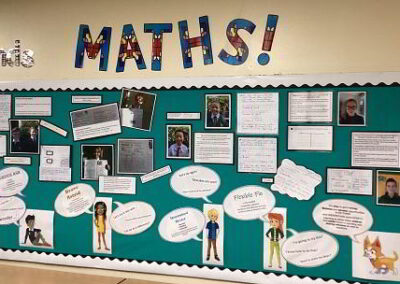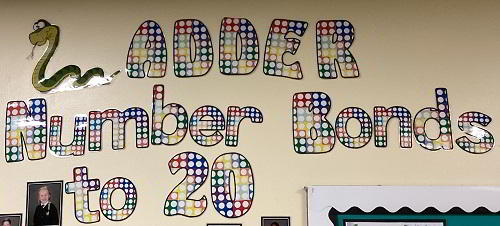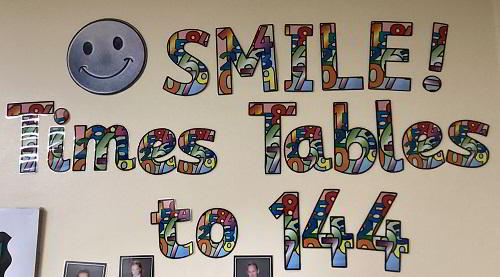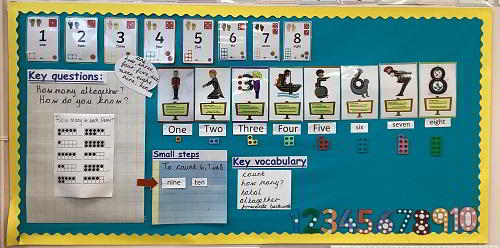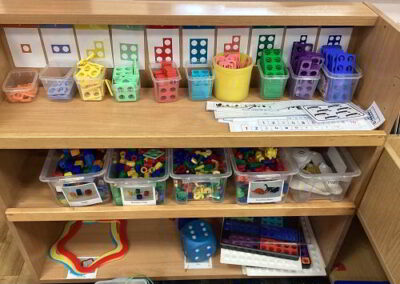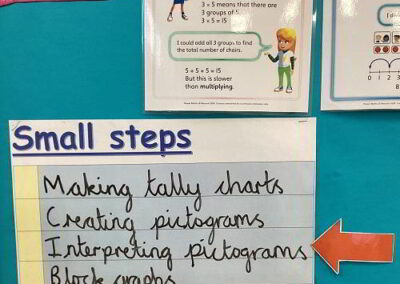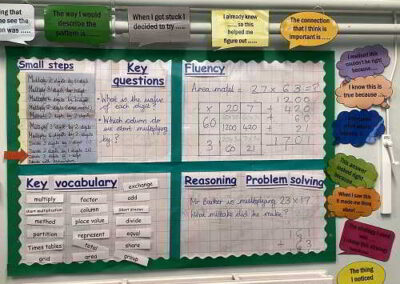Maths at Hill View Primary Academy
Maths Intent
At Hill View, our intent is to deliver active, engaging and challenging Maths lessons that are well-planned and underpinned by the National Curriculum, using clear knowledge and skills progressions. Through the use of the Power Maths scheme and our own adaptations, we teach Maths using a mastery approach to enable every child to make at least good progress from their starting points. In addition, we use fluid groupings, concrete, pictorial and abstract methods to ensure that all children have a secure understanding of their mathematical learning within an equitable culture. We teach children to think and reason mathematically and to have a good understanding of number fluency. Through the use of reasoning and problem solving, children work both independently and collaboratively to nurture their ideas and solve challenging Maths problems. All children will approach maths with a growth mind-set and resilience, happy to grapple and be flexible in their thinking, grounded by sound mathematical knowledge and understanding.
Our ASCENT values are evident throughout our Maths approach, and exemplify our commitment to the development of well-rounded, aspirational life-long learners, who strive to show excellence within maths. We ensure that our children leave Hill View as competent and confident mathematicians for the future and are able to meet new challenges in the next key stage and beyond.
Maths Progression
Strand Progressions
The Maths Strand Progressions are currently under review
Maths Progression EYFS
Number Addition & Subtraction, Multiplication & Division Progression
Number and Place Value Progression
Number Fractions Progression
Algebra Progression
Geometry Progression
Measurement Progression
Ratio and Progression Progression
Statistics Progress
Whole School Sequence of Learning Progression
Whole School Sequence of Learning Progression updated September 2023
Year Group Sequence of Learning Progression
EYFS Maths Sequence of Learning Progression
Y1 Maths Sequence of Learning Progression
Y2 Maths Sequence of Learning Progressions
Y3 Maths Sequence of Learning Progressions
Y4 Maths Sequence of Learning Progression
Y5 Maths Sequence of Learning Progression
Y6 Maths Sequence of Learning Progression
- looking for patterns and relationships between numbers
- making sense of and checking information
- communicating and presenting maths using words and diagrams, for example, graphs and symbols
- reasoning and developing mathematical arguments.
- sorting
- ordering
- grouping
- measuring
- calculating
- comparing
- manipulating, organising and interpreting information.
Hill View Primary Calculation Policies
Power Maths Reception Calculation Policy
Power Maths KS1 Calculation Policy
Power Maths LKS2 Calculation Policy
Power Maths UKS2 Calculation Policy
Number Facts - Fluency Overview

Homework
Homework
Key Stage 2
In Key Stage 2, Years 3 to 6 are set weekly online Maths homework from Maths Flex – this is an intelligent, flexible and personalised KS2 maths practice service, with work set by the teacher, (supporting the learning that has taken place and that reflects the small steps teaching approach) with a recommendation engine to set practice while adapting to your child’s own strengths and weaknesses. Your child should receive personal log-in details for this – please speak to your child’s teacher if you have not been provided with these. Homework is set on a Friday and is due back into school on a Wednesday. There will be a Wednesday Homework Club to support children who have found it difficult to complete that week’s homework.
Click here to view the Maths Flex PowerPoint video
Your child also has the opportunity to practice their Multiplication Tables through the Times Tables Rock Stars website. Your child should have a personal log-in to this site, please speak to their class teacher if you do not have this.
Key Stage 1
Children will be provided with a Maths Homework book. Maths homework is set by their teacher, and directly relates to the learning taking place in school. Homework is set on a Friday and is due back into school on a Wednesday. There will be a Wednesday Homework Club to support children who have found it difficult to complete that week’s homework.
Your child also has the opportunity to practice their Number Bonds through the NumBots website, and in Year 2, Multiplication Tables through the Times Tables Rock Stars website. Your child should have a personal log-in to these sites, please speak to their class teacher if you do not have this.
Please find all links to these websites and other useful site below.
Entitlement and enrichment:
At Hill view, we ensure children have access to a rich Maths curriculum that is tailored to meet the needs of all children: girls, boys, children with Special Educational Needs, Pupil Premium children and children with English as an additional language. All children are given opportunities to use Maths skills across a range of activities, within the wider community, including: TT Rockstars clubs and Girls Maths Groups. This affords children the opportunity to experience real life Maths problems in different contexts and builds on Cultural Capital.
Breadth and Balance: (progression of skills): 
Please see links to all year groups that shows progression of skills for Maths as children move through the school.
Teaching narrative:
Within a Maths lesson, children will have daily opportunities to “grapple” or freely explore problems using known strategies to “figure it out” – this pedagogy is designed to build schema, resilience and mastery. Teachers will use mathematical language and concrete representations to model new concepts to all children. Children will then use such mathematical language to explain their reasoning around the decisions and choices they have made to solve a problem.
Concrete Pictorial Abstract representations (CPA)
In all year groups, multiple representations will be used to help children explore and demonstrate mathematical ideas. Initially, when a new concept is introduced, all children will use concrete objects and manipulatives to help with understanding – this will encourage them to explain the processes and methods used to find answers.
After exploring concepts with concrete resources, children will be given opportunities to build on their understanding using appropriate pictorial representations. Once children are confident with this, they move on to an abstract approach using numbers and symbols with key concepts. In addition, children will be given reasoning and problem solving opportunities daily in order to fully understand, explore and apply ideas rather than accelerate through topics. Challenge will come from investigating a concept in new, alternative and more complex ways with the use of mastery challenges.
Fluency
Children will be given opportunities to recall and apply their mathematical knowledge through frequent, well-targeted practise. This will help them to achieve a high level of fluency. However, as well as articulating facts and processes, children will begin to move between contexts and representations, recognise relationships and make connections within number. Adder and Smile badges will be rewarded to children with fast recall of facts. Teachers will use TT Rock Stars and Numbots from Year 1 to Year 6 to promote practice of recalling number facts and times table facts, at home and in school.
Reasoning 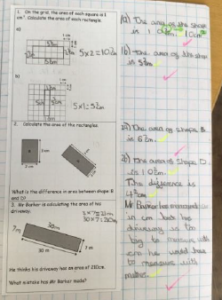
Children will be given the opportunity to explore reasoning during Maths lessons. Such tasks can be implemented both verbally and written. This type of mathematical learning will have the greatest impact on your children’s understanding of Maths concepts. Power Maths is designed to introduce new vocabulary in a sequenced and structured manner. Key vocabulary is reinforced during each lesson; encouraging the children to explain ideas and processes in full detailed sentences.
Problem Solving
Children will identify, understand and apply relevant principles to make connections and links between different concepts. The aim is to build on the skills needed to tackle new problems, understand, in depth, how to get to an answer and use many methods and apply them in different contexts.
Assessment and outcomes:
Pupils are assessed in multiple ways throughout the year:
- Summative assessment is implemented on a daily basis in class by both children and adults. This may occur through questioning or live feedback against the Learning Intention and Success Criteria
- Work produced in books
- On-going teacher assessment against the Ready To Progress Assessment Criteria with triangulation of Formative Assessment (termly PUMA tests and in Year 6 practise SATs tests.)
- Pupil conferencing
- Assessment in PUMA and SATS tests (formative assessment)
- Homework
Resources and Links
Power Maths: https://www.activelearnprimary.co.uk
Maths Flex (Key Stage 2 Homework): Maths Flex login
White Rose: https://whiterosemaths.com/
NumBots: https://play.numbots.com/#/account/school-login/20786
TT Rock Stars: https://ttrockstars.com
Oak National Academy: https://www.thenational.academy/


